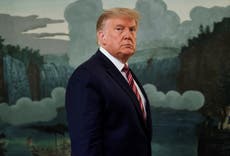Bob Woodward criticised for holding back Trump coronavirus interview tape while pandemic raged
Critics argue that releasing tapes during explosive spread could have saved thousands of lives
Your support helps us to tell the story
From reproductive rights to climate change to Big Tech, The Independent is on the ground when the story is developing. Whether it's investigating the financials of Elon Musk's pro-Trump PAC or producing our latest documentary, 'The A Word', which shines a light on the American women fighting for reproductive rights, we know how important it is to parse out the facts from the messaging.
At such a critical moment in US history, we need reporters on the ground. Your donation allows us to keep sending journalists to speak to both sides of the story.
The Independent is trusted by Americans across the entire political spectrum. And unlike many other quality news outlets, we choose not to lock Americans out of our reporting and analysis with paywalls. We believe quality journalism should be available to everyone, paid for by those who can afford it.
Your support makes all the difference.As Donald Trump comes under siege for telling journalist Bob Woodward in February that he was deliberately downplaying the coronavirus in public, Mr Woodward himself is facing criticism for not reporting the interview sooner.
The news of the interviews and ensuing backlash comes as the estimated US coronavirus death toll nears 200,000, with several states still struggling to bring outbreaks under control.
The audio of Mr Woodward’s 7 February discussion with the president, conducted for his upcoming book Rage, captures Mr Trump relating what he knew of the disease, saying that it is “more deadly than even your strenuous flu” and calling it “deadly stuff".
In a later exchange in March, while the disease was spreading furiously and the administration was doing little to stop it, Mr Trump acknowledged that his public statements did not reflect what he actually knew about the pathogen and its progress. “I still like playing it down,” he said, “because I don’t want to create a panic.”
Given that these exchanges occurred before and during vital phases in the pandemic when government action could have limited the virus’s spread, many have attacked Mr Woodward for not exposing Mr Trump’s statements at the time.
ProPublica’s Jessica Huseman took a hard line: “How differently might Trump's supporters have acted if – this whole time – they knew that he knew COVID was a serious threat?” she tweeted. “Woodward could have made that happen in February.”
AdWeek’s Scott Nover made a similar point, citing particular quotes from the Woodward tapes. “‘I wanted to always play it down.’ This is a quote from March 19th. I don't know how you sit on this for six months.
“This is really troubling. As journalists we're supposed to work in the public interest. I think there's been a failure here.”
The Washington Post’s media critic, Eric Wemple, came to Mr Woodward’s defence, pointing out that had he released the February interview immediately, he would have thrown away any chance of interviewing Mr Trump again – and especially not another 17 times.
“It strikes me that the choice isn't between Woodward publishing this revelation in September and, say, March,” he wrote. “It's between Woodward publishing this in September or not at all.”
However, speaking to the same paper, Mr Woodward denied that this was why he did not publish immediately, instead citing the twin problems of not knowing whether Mr Trump was relaying accurate information (though it turned out he was) or what his source was.
With the audio of the exchanges making it impossible to claim the story is a fabrication, Mr Trump has defended himself from what he called “the political hit job by rapidly fading Bob Woodward and his boring book” by insisting that avoiding panic was a valid reason for keeping his predictions about the outbreak optimistic.
He has now entered the fray on Twitter to claim that Mr Woodward’s holding back the interview tape signals that its contents are not unflattering.
“Bob Woodward had my quotes for many months,” he wrote. “If he thought they were so bad or dangerous, why didn’t he immediately report them in an effort to save lives? Didn’t he have an obligation to do so? No, because he knew they were good and proper answers. Calm, no panic!”


Join our commenting forum
Join thought-provoking conversations, follow other Independent readers and see their replies
Comments